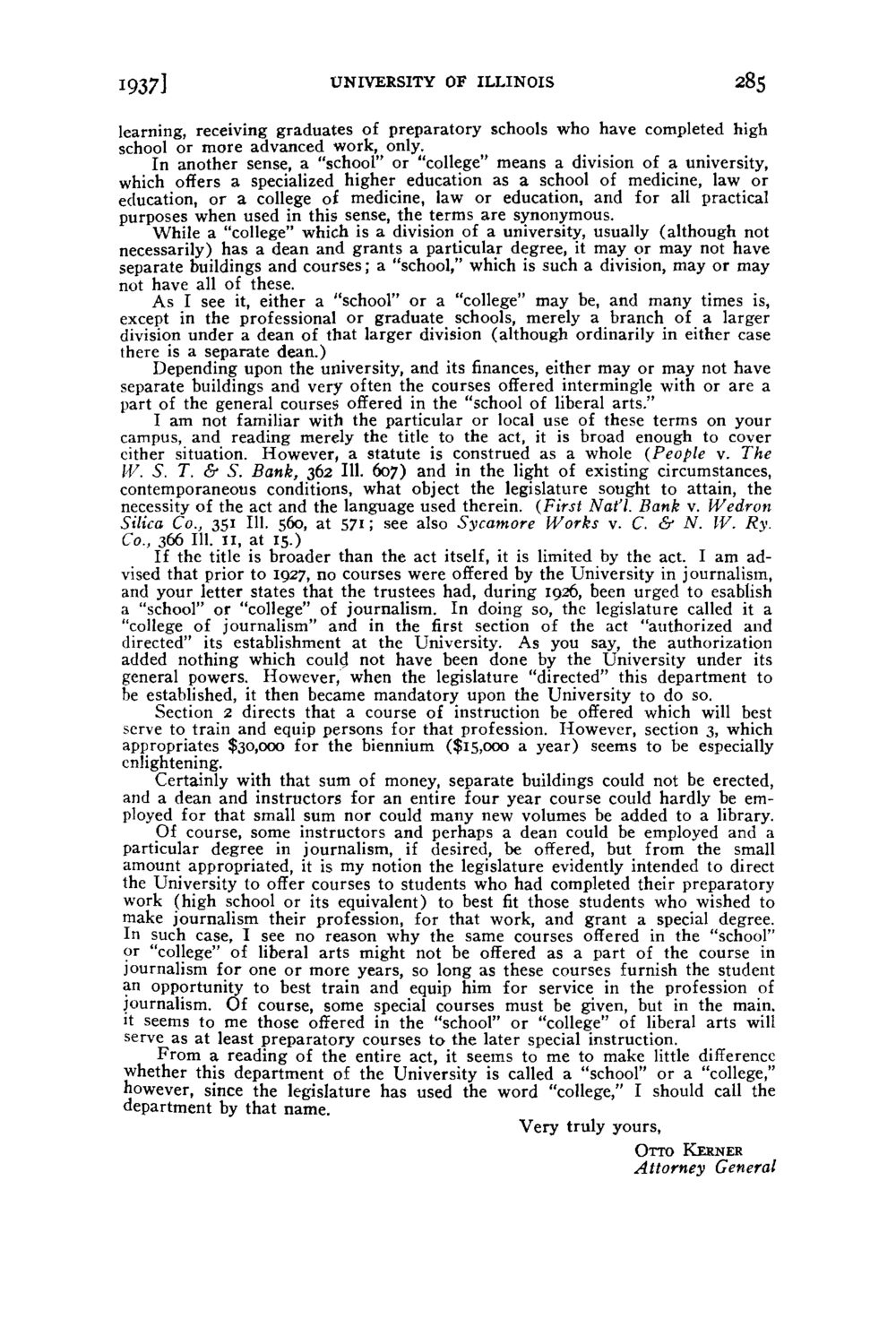| |
| |
Caption: Board of Trustees Minutes - 1938
This is a reduced-resolution page image for fast online browsing.

EXTRACTED TEXT FROM PAGE:
1937] UNIVERSITY OF ILLINOIS 28S learning, receiving graduates of preparatory schools who have completed high school or more advanced work, only. In another sense, a "school" or "college" means a division of a university, which offers a specialized higher education as a school of medicine, law or education, or a college of medicine, law or education, and for all practical purposes when used in this sense, the terms are synonymous. While a "college" which is a division of a university, usually (although not necessarily) has a dean and grants a particular degree, it may or may not have separate buildings and courses; a "school," which is such a division, may or may not have all of these. As I see it, either a "school" or a "college" may be, and many times is, except in the professional or graduate schools, merely a branch of a larger division under a dean of that larger division (although ordinarily in either case there is a separate dean.) Depending upon the university, and its finances, either may or may not have separate buildings and very often the courses offered intermingle with or are a part of the general courses offered in the "school of liberal arts." I am not familiar with the particular or local use of these terms on your campus, and reading merely the title to the act, it is broad enough to cover cither situation. However, a statute is construed as a whole (People v. The W. S. T. &• S. Bank, 362 111. 607) and in the light of existing circumstances, contemporaneous conditions, what object the legislature sought to attain, the necessity of the act and the language used therein. (First Nat'l. Bank v. Wedron Silica Co., 351 111. 560, at 571; see also Sycamore Works v. C. & N. IV. Ry. Co., 366 111. 11, at 15.) If the title is broader than the act itself, it is limited by the act. I am advised that prior to 1927, no courses were offered by the University in journalism, and your letter states that the trustees had, during 1926, been urged to esablish a "school" or "college" of journalism. In doing so, the legislature called it a "college of journalism" and in the first section of the act "authorized and directed" its establishment at the University. As you say, the authorization added nothing which could not have been done by the University under its general powers. However, when the legislature "directed" this department to be established, it then became mandatory upon the University to do so. Section 2 directs that a course of instruction be offered which will best serve to train and equip persons for that profession. However, section 3, which appropriates $30,000 for the biennium ($15,000 a year) seems to be especially enlightening. Certainly with that sum of money, separate buildings could not be erected, and a dean and instructors for an entire four year course could hardly be employed for that small sum nor could many new volumes be added to a library. Of course, some instructors and perhaps a dean could be employed and a particular degree in journalism, if desired, be offered, but from the small amount appropriated, it is my notion the legislature evidently intended to direct the University to offer courses to students who had completed their preparatory work (high school or its equivalent) to best fit those students who wished to make journalism their profession, for that work, and grant a special degree. In such case, I see no reason why the same courses offered in the "school" or "college" of liberal arts might not be offered as a part of the course in journalism for one or more years, so long as these courses furnish the student an opportunity to best train and equip him for service in the profession of journalism. Of course, some special courses must be given, but in the main. it seems to me those offered in the "school" or "college" of liberal arts will serve as at least preparatory courses to the later special instruction. F r o m a reading of the entire act, it seems to me to make little difference whether this department of the University is called a "school" or a "college," however, since the legislature has used the word "college," I should call the department by that name. Very truly yours, OTTO KERNER Attorney General
| |